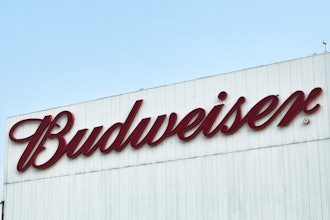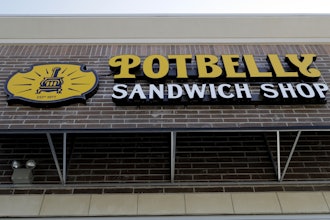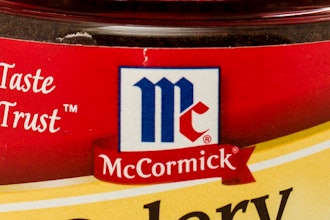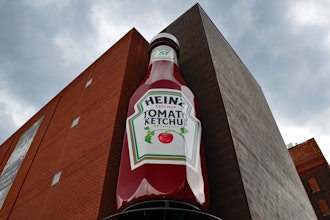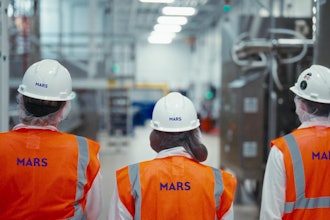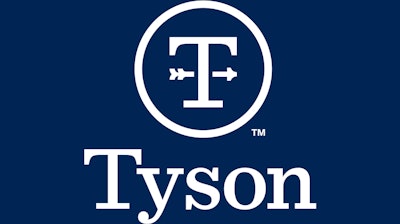
SPRINGDALE, AR — On June 9, Tyson Foods announced its ambition to achieve net-zero greenhouse gas (GHG) emissions across its global operations and supply chain by 2050, including scopes 1, 2 and 3. As the first U.S.-based protein company to have an emissions reduction target approved by the Science Based Targets initiative (SBTi), this ambition, in conjunction with the release of the company’s fiscal year 2020 (FY20) SUSTAINABILITY PROGRESS REPORT, underscores the company’s commitment to help combat the urgency of the growing climate change crisis.
“At Tyson Foods, we believe progress requires accountability and transparency and we are proud to exemplify that as we work to achieve net-zero greenhouse gas emissions by 2050,” said John R. Tyson, Chief Sustainability Officer, Tyson Foods. “As the first U.S.-based protein company in the food and beverage sector to have an emissions reduction target approved by the Science Based Targets initiative, we hope to continue to push the industry as a leader and remain committed to making a positive impact on our planet, with our team members, consumers and customers, and in the communities we serve.”
The move to net zero is an expansion of the company’s current science-based target of achieving a 30% GHG emissions reduction by 2030, which is aligned with limiting global temperature rise to 2.0℃. As a global organization with 239 facilities and 139,000 employees worldwide, achieving net zero emissions is a large undertaking which will look at emissions tied to direct global operations, energy sources and throughout the company’s supply chain. Requiring a collective effort from every team member in addition to external stakeholders, key areas the company will be prioritizing to meet this goal include:
- Updating the baseline for emissions to align with limiting global temperature rise to 1.5℃, consistent with the Paris Agreement, by the end of 2023.
- Establishing a pathway to using 50% renewable energy across its domestic operations by 2030.
- Completing initial land stewardship target of engaging 2 MILLION FEED ACRES and expanding the total acres by 2025, including a total target of 100% of feed purchased by 2030.
- Expanding the company’s current 5 MILLION ACRE GRAZING LANDS target for sustainable beef production practices by 2025.
- Continuing work to eliminate DEFORESTATION risk throughout its global supply chain by 2030.
- Supporting climate action policies through advocacy groups such as the NET ZERO BUSINESS ALLIANCE.
“We believe what good food can do for people and the planet is powerful. Our net zero ambition is another important step in our work toward realizing our aspiration to become the most transparent and sustainable food company in the world,” said Donnie King, Tyson Foods President and CEO. “Partnership and collaboration will be critical to our efforts, and we look forward to working with our customers, supply chain partners, and other stakeholders to achieve net zero.”
Tyson Foods’ new ambition, along with the company’s existing sustainability goals, is aligned with the UN SUSTAINABLE DEVELOPMENT GOALS. As part of its ongoing work in this space, Tyson will continue its involvement in World Wildlife Fund Forest Land and Agriculture (FLAG) Consultative Group and continue partnerships and collaborations with organizations such as World Resources Institute, The Nature Conservancy, Environmental Defense Fund, and World Wildlife Fund. Tyson will work with partners to identify and build on the existing net zero pathway, focusing on investments, renewable energy, land stewardship, deforestation, manure management, farm energy, feed, fertilizer, enteric methane and external partnerships.
“It’s great to see Tyson Foods embrace net zero as a business imperative,” said Jenny Ahlen, Senior Director at Environmental Defense Fund. "Success will be determined by what follows next, because the hard work is only beginning. We're excited to work with Tyson in developing an action plan and interim targets, and to drive change at scale."
The introduction of this new ambition comes in conjunction with the release of the company’s FY2020 Sustainability Progress Report which details how the company is delivering on its sustainability targets across all of its business operations and shares the company’s integrated approach to sustainability. The report focuses on three main pillars that reflect Tyson’s core values and goals: Empowering People, Customers and Communities; Conserving Natural Resources and Protecting Our Planet; and Innovating Smart, Responsible Agriculture, and puts accountability on each and every team member to think about and enact meaningful change within their business units.
Key achievements in FY2020 include:
- Empowering People, Customers and Communities
- An industry-first addition of a CHIEF MEDICAL OFFICER position.
- Offered ESL, financial literacy and citizenship classes across 59 plants, representing more than half of our US-based locations.
- The introduction of UPWARD PATHWAYS, a new approach to create opportunities for and encourage upward mobility for the company’s team members.
- DONATED MORE FOOD in a year than ever before in the company’s 85-year history amounting to 31 million pounds or 124 million meals, valued at $65 million.
- Conserving Natural Resources and Protecting Our Planet
- Set new contextual water targets that consider local environments and conditions across three priority facilities.
- Transitioned virgin fiber paperboard to 100% post-consumer recycled (PCR) content across the Jimmy Dean® brand.
- Launched zero waste to landfill pilot projects at three production facilities and diverted nearly 5.2 million pounds of waste from landfills, a 60% increase from 2019.
- Innovating Smart, Responsible Agriculture
- Became the FIRST U.S. FOOD COMPANY to announce work to verify sustainable production practices at scale in our beef supply chain.
- Developed and publicly released a FOREST PROTECTION STANDARD outlining steps to continue minimizing deforestation risk and protect the forests in the 6% of the company’s land footprint that was identified as medium-to-high risk of deforestation.
- Became the first company to receive third-party certification by the Professional Animal Auditor Certification Organization (PAACO) for all poultry audits within our FarmCheck audit program.
The report and accompanying information can be found at Tyson Foods’ ENVIRONMENTAL, SOCIAL AND GOVERNANCE (ESG) HUB, which provides resources on all sustainability initiatives, including background information on key topics, ESG-related policies and an ESG data center. More information on the company’s net zero emissions ambition can be found HERE.











